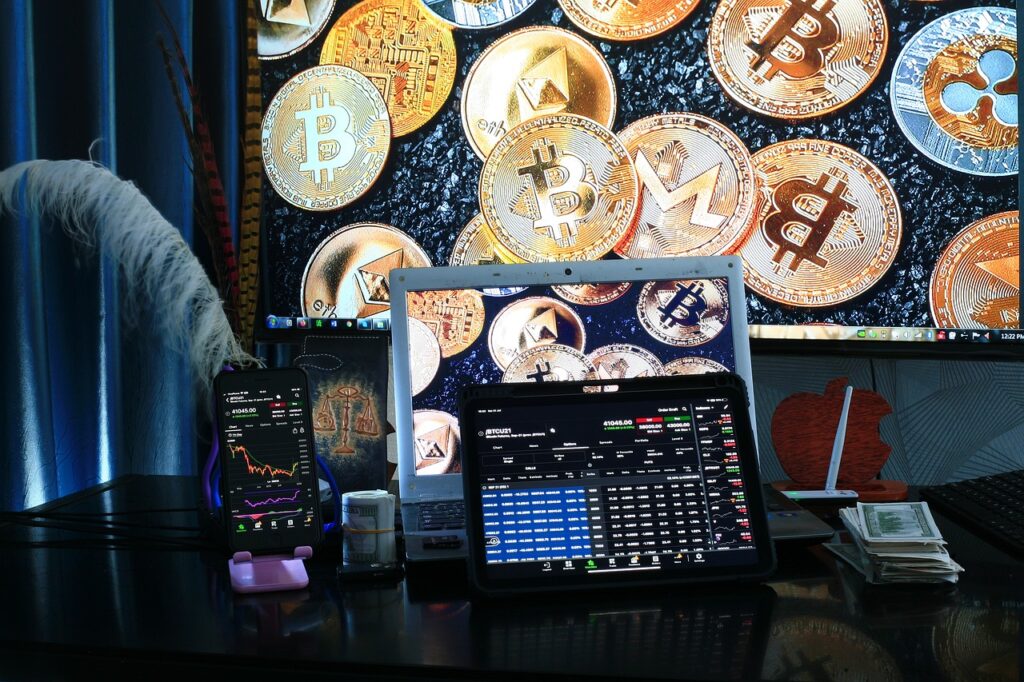Relationship of Politics, Economics, and Crypto

In the world of finance, there is hardly a topic that has generated as much debate and excitement as Bitcoin. Launched in 2009 by an anonymous individual or group under the pseudonym Satoshi Nakamoto, Bitcoin has revolutionized the concept of money by providing a decentralized and digital alternative to traditional currencies. Trump Bitcoin
Over the years, Bitcoin has evolved from a niche asset to a global financial phenomenon, but the development has been anything but smooth. One prominent figure whose position on Bitcoin has been widely discussed is former US President Donald Trump.
Trump, known for his strong opinions and unconventional approaches to politics, is conspicuously skeptical of Bitcoin and cryptocurrencies in general. His position stands in contrast to the growing interest and acceptance of digital currencies among investors, technologists, and even governments.
Trump’s View of Bitcoin: A Skeptic’s Perspective
Donald Trump has repeatedly expressed skepticism about Bitcoin and other cryptocurrencies, often portraying them as speculative and risky assets. His disdain for Bitcoin can be summed up in several key comments he made during his presidency and beyond.
Bitcoin as a “fraud” and “scam”
One of Trump’s most notable comments about Bitcoin came in 2019 when he called Bitcoin a “scam” and “not money.” He expressed concern about the lack of central control over the cryptocurrency, claiming that it could potentially be used for illegal activities such as money laundering and tax evasion.
Trump also emphasized that Bitcoin’s volatility makes it unsuitable to be considered a legitimate form of currency. Trump Bitcoin
The Importance of Central Governance
Trump’s view of Bitcoin is based on his broader philosophy of monetary policy and governance. Trump is a supporter of traditional institutions and systems, and prefers a centralized approach to monetary management.
During his presidency, he reiterated the idea that the US dollar was the world’s primary reserve currency and should remain under the control of the US Federal Reserve.
Bitcoin, on the other hand, is based on a decentralized peer-to-peer network, which directly undermines the centralized control that governments and central banks exercise over traditional fiat currencies.
For Trump, the decentralization of Bitcoin represents a challenge to the established financial system that he wants to preserve. Trump Bitcoin
Competition with the US dollar
Another important reason for Trump’s opposition to Bitcoin is the potential competition it poses to the US dollar. Since the US dollar is the global reserve currency, any widespread use of Bitcoin could undermine the dollar’s dominance in international trade and finance.
Trump’s support for the dollar, evident in his trade
ocurrencies.
Organize and Control
Trump has been a vocal supporter of deregulation throughout his career, but in the case of cryptocurrencies, he has called for stricter regulation and oversight. In 2021, Trump is concerned about the rise of cryptocurrencies and is calling for mandatory government regulation to ensure that digital currencies do not threaten national security and financial stability.
His preference for regulation stems from his belief that the government should have control over the financial system and that the lack of regulation of Bitcoin could lead to unforeseen risks.
Trump’s Economic Policies and Their Impact on Bitcoin
While Trump’s views on Bitcoin are largely negative, his economic policies and actions during his presidency have had indirect consequences for the crypto market.
His administration’s positive stance on issues such as monetary policy, taxation, and regulation point to an unstable economic environment that has fueled the rise of Bitcoin as an alternative investment.
Monetary Policy and Concerns
One of the main reasons for the interest in Bitcoin during the Trump presidency was the Federal Reserve’s expansionary monetary policy. Trump Bitcoin
in response to the COVID-19 pandemic, the Federal Reserve is cutting interest rates to near zero and making corresponding asset purchases, injecting trillions of dollars into the economy. This raises concerns about what makes Bitcoin an attractive store of value.
The huge supply of 21 million coins and its deflationary nature made Bitcoin an attractive hedge against possible currency devaluation.
Although the Trump administration did not directly support Bitcoin as a hedging tool, the economic policies ensuring the stability of the dollar failed to increase interest in digital currencies.
The Rise of Digital Assets in a Digital World
During the Trump presidency, the world experienced an accelerated trend towards digitization, with more people conducting financial transactions online and businesses using digital currencies. The Covid-19 pandemic has accelerated this trend as businesses and consumers increasingly turn to digital platforms for transactions and investments.
While the Trump administration has been critical of cryptocurrencies, it has inadvertently played a role in the adoption of digital assets by creating an environment where digital currencies can thrive.
Trump’s Presidency Comments on Bitcoin Trump Bitcoin
After leaving office in January 2021, Trump continued to express his skepticism about Bitcoin. However, he also acknowledged the influence of cryptocurrency and the ongoing need for additional regulation.
Bitcoin Price Volatility
Trump has highlighted Bitcoin’s extreme price volatility as one of the key risks of investing in the cryptocurrency. When Bitcoin reached new record highs in 2021, Trump was convinced that the cryptocurrency market was too speculative and too likely to experience large price swings.
His comments were specifically aimed at retail investors who, while lured by the promise of high returns, risk significant losses due to Bitcoin’s unpredictable price movements.
Regulation and Government Control
Trump has called for stricter regulation of cryptocurrencies as Bitcoin and other digital assets grow in popularity.
His calls for regulation reflect broader concerns about financial security, fraud, and the potential for illegal activity in the cryptocurrency market. But his push for regulation also addresses the inherent tension between government control and Bitcoin’s decentralized nature.
Trump’s Role in Shaping the Bitcoin Story
Despite his negative views on Bitcoin, Donald Trump’s comments during and after his presidency have played a significant role in shaping the larger narrative surrounding Bitcoin and cryptocurrencies.
By publicly criticizing Bitcoin and other digital currencies, Trump has sparked a debate about the legitimacy of cryptocurrencies and their place in the global financial system.
On the other hand, Trump’s skepticism also highlights Bitcoin’s potential to disrupt traditional financial systems.
As the world grapples with economic uncertainty, Bitcoin has become a symbol of the desire for alternative financial systems that are less dependent on government control and central banks.
Diploma

Donald Trump’s position on Bitcoin reflects his broader economic and political philosophy. His criticism of Bitcoin as a speculative asset, coupled with his belief in the centralization of monetary control, puts him at odds with Bitcoin’s decentralized nature.
Whether Bitcoin will ultimately replace or coexist with traditional currencies remains uncertain, but discussing Trump’s positions on Bitcoin is an important part of understanding the broader context in which cryptocurrencies are emerging.